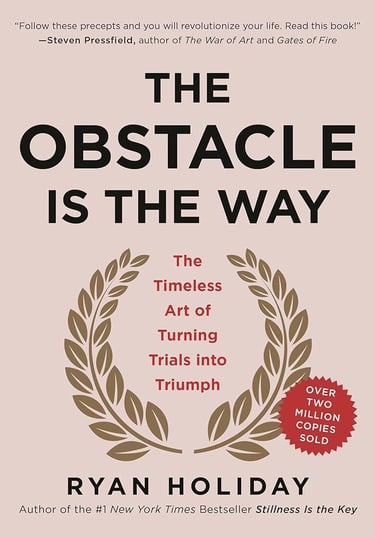The Obstacle is the Way
"The impediment to action advances action. What stands in the way becomes the way."
BOOKS
8/4/20252 min read


Turning Trials into Triumphs: Lessons from "The Obstacle Is The Way"
In a world obsessed with smooth sailing and frictionless paths, Ryan Holiday's "The Obstacle Is The Way" offers a profoundly counterintuitive yet deeply empowering message: the very challenges we face are not deterrents, but rather the raw material for our growth and success. Drawing heavily from Stoic philosophy, Holiday argues that our perception and approach to obstacles determine our ultimate outcomes.
This isn't just a feel-good mantra; it's a practical framework with profound implications for how we navigate life, lead organizations, build teams, and foster individual resilience.
For Individuals: The Forge of Self-Mastery
At a personal level, Holiday's philosophy is a call to radical acceptance and proactive action. Instead of being paralyzed by setbacks, individuals are encouraged to:
Reframe adversity: See problems not as personal attacks, but as opportunities to learn, adapt, and innovate. A missed promotion becomes a chance to acquire new skills. A personal failure becomes a lesson in humility and perseverance.
Focus on what's controllable: The Stoics teach us to distinguish between what is in our power (our thoughts, actions, reactions) and what is not (external events, other people's opinions). This empowers individuals to exert influence where it matters most, rather than fretting over the uncontrollable.
Develop resilience: By consistently confronting and working through difficulties, individuals build a mental toughness that prepares them for even greater challenges down the line.
For Leaders: Guiding Through the Gauntlet
Leaders are constantly faced with obstacles, from market disruptions to internal conflicts. "The Obstacle Is The Way" provides a powerful blueprint for effective leadership:
Embrace the problem: True leaders don't shy away from difficulties; they confront them head-on. They see complex problems as opportunities to demonstrate strategic thinking and inspire their teams.
Cultivate calm in chaos: Stoicism emphasizes maintaining equanimity under pressure. A leader who can remain calm and rational when facing a crisis instills confidence and clarity in their team.
Be resourceful and adaptive: Instead of lamenting what can't be done, leaders inspired by Holiday's work actively seek creative solutions within existing constraints. They turn limitations into levers for innovation.
For Teams: Collective Resilience and Innovation
A team that adopts the "obstacle is the way" mindset transforms challenges into collaborative victories:
Shared problem-solving: Instead of pointing fingers, teams focus on collectively analyzing the obstacle and brainstorming diverse solutions. This fosters a stronger sense of unity and shared purpose.
Learning culture: Failures are viewed not as end-points, but as valuable data points for collective learning and improvement. This encourages experimentation and reduces the fear of making mistakes.
Increased adaptability: Teams become more agile and responsive to unexpected changes, viewing them as new terrains to conquer rather than insurmountable barriers.
For Organizations: An Unstoppable Momentum
At an organizational level, embracing this philosophy can build an unstoppable momentum:
Strategic Advantage: Companies that consistently view obstacles as opportunities for differentiation and improvement can gain a significant edge over competitors who are paralyzed by them.
Culture of Innovation: When the entire organization understands that problems are catalysts, innovation flourishes. Departments are more willing to test new ideas and iterate based on feedback, even if it reveals flaws.
Long-term Sustainability: Organizations that learn to thrive amidst adversity are inherently more resilient and better positioned for long-term success, weathering economic downturns and market shifts with greater fortitude.
In essence, "The Obstacle Is The Way" isn't about wishing problems away. It's about recognizing their inherent value, developing the mindset to approach them strategically, and ultimately, using them as the very means by which we achieve our greatest triumphs. For anyone seeking to lead, build, and grow in a complex world, this book offers an indispensable guide.